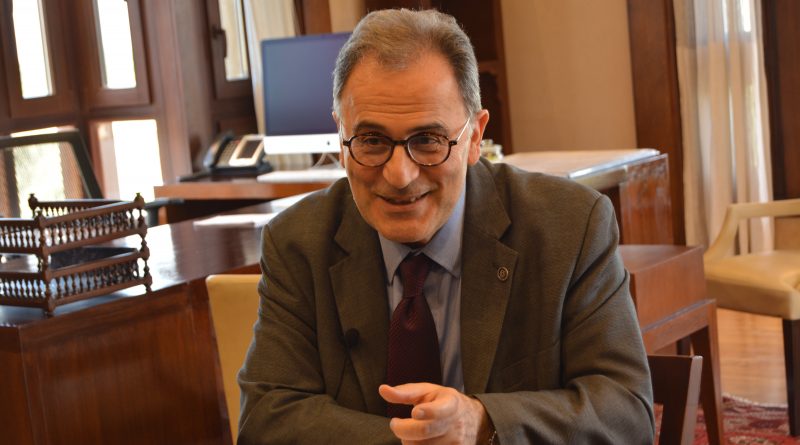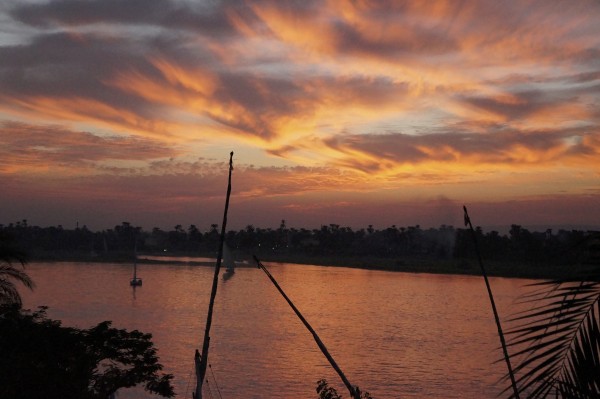Dallal Wants to Mobilize AUC Talent
By: Hanya Captan
@HanyaCaptan
President Ahmad Dallal is on a fact-finding mission.
Since his inauguration last month and even before that, he’s been meeting with the university’s senior leadership and students to gauge community response to the status and health of the institution, and how to move AUC forward so that it continues to be an academic pioneer in the region.
It’s not going to be easy; AUC has weathered several crises from the post-2011 period of national instability to the flotation of the Egyptian pound and more recently the Covid-19 pandemic. Does AUC have what it takes?
“The university’s survival is not just over the last 10 or 11 years, this university is 100 years old, there are many, many changes that the university went through in the surrounding environments, the regional environment and so on. So we survived all of that. And that is a testimony to the fact that the university is deeply rooted and has tremendous resilience and staff,” Dallal said during an exclusive interview with The Caravan.
It’s that kind of resilience that the AUC President believes should be reinforced as we move forward, with the university serving as a key primary interlocutor with institutions of higher learning.
“The university should be at the forefront of providing exemplary higher education in the region, and engaging with global institutions of higher education,” continued Dallal.
He went on to discuss the exciting transformations currently being undergone by higher education institutions around the world.
“This started before COVID, but COVID accelerated the feeling across higher education institutions that there are things that should be done differently,” said Dallal.
“We don’t know exactly how but we know that it’s going to happen. And I think AUC should be at the forefront…and engage [with] the region and be part of the global conversation on the subject,” Dallal went on to say.
The global conversation will revolve around the past, present and future challenges that higher education is facing. Key questions include what education should be about, what should help shape it, and what combination between liberal arts education and having a liberal arts space is ideally conducive to to overcome all these challenges.
“What type of students should we be training?” Dallal said.
In localizing AUC’s challenges, Dallal spoke of the university’s engagement with the greater Egyptian context in which it operates.
“I think a key challenge for us at AUC is to engage with the massive developments that are happening in Egypt before thinking of anywhere else,” said Dallal.
“The country is undergoing tremendous transformation. It is growing, the economy is growing. There are significant transformations in the way business is run…and the type of workforce that is needed to develop the emerging needs of the country,” continued Dallal.
In combining the two challenges facing AUC, Dallal stated that we first need to start locally.
“So in addition to the regular transformations that are happening in higher education, we need to get sponsorship, there are challenges of scale. And I think we need to think very carefully about how you stay in this context. We are a small institution, we might grow but we will not grow tremendously. We will not be able to provide all the needs of higher education in Egypt and in the region,” the AUC President explained.
This, however, does not negate the role the AUC leadership has to play, but rather, elevates its importance.
“We have a very unique role to play. And we shouldn’t be comfortable with the fact that we are small, we should figure out how given our small size, we could engage with the massive developments around us and contribute to the purpose of the economy around us and everything happening around us,” said Dallal.
The AUC President revealed that one of the big questions he’s been considering is how the university can engage and serve effectively on the scale of the country. How can AUC respond to the needs of the country properly and appropriately?
In overcoming these challenges, President Dallal has a vision.
“The primary tool is to mobilize our community … We have some real gems in this university, I mean, sometimes they’re not appropriately recognized, [but] we really have some amazing talent in our faculty and our students,” said Dallal.
“We need to mobilize our collective wisdom and figure out what it is that we want to do in the 21st century, what work should be the focus of our educational development, what programs should we be introducing,” continued Dallal.
However, this progress is not reliant on one individual. It needs the collaboration of everyone.
“This is not [something] that any individual can do and it’s not the vision of an individual. It’s really hard work. You need a little bit of good luck, you need a little bit of vision, but more than anything, you need systematic hardware and you need to go into the system of our hardware because we cannot do everything,” said Dallal.
Going into the academic system to improve efficiency is in of itself a herculean effort, but when one couples these efforts with the drive to make the university a truly equal opportunity institution, the mission to become regional pioneers becomes within reach.
“We should aim to recruit the brightest students, regardless of their income, which means we need to continue to think regularly of our recruitment policy and strategize the way we approach recruitment. I think there is already work, which has been done to assess and revisit the way we do things on this front, and this is something that we need to continue to do,” said Dallal.
“But the key thing here is to provide access to students who normally wouldn’t even dream of applying to AUC because it is outside their limit. Our aim should be to reach out to the most qualified students and tell them that they have room here within our community, regardless of their financial abilities, which means we need to mobilize resources to support it,” continued Dallal.
Bringing the discussion back to the programs at AUC, President Dallal is interested in transferring a slice of the innovation happening around the world to AUC.
“There are studies that show globally which areas are universities focusing on developing. New areas of research, new areas of teaching, new programs and programmatic offerings. This is happening across the globe and can apply to us as well,” said Dallal.
“Issues that have to do with Data Science and the way that it transforms lives, sometimes for the worse, sometimes for the better. These are the types of things where we need to build the capacity for, we have already some capacity, but we need to figure out where to direct it, where to focus it,” went on Dallal.
President Dallal also has an interest in programmes related to the environment and access to resources.
These include issues related to climate change and environmental studies, resource management, the nexus of water, food, and energy, urban studies, data science and sustainability, to name a few.
“These are all possibilities, and many, many universities across the globe are creating programs in these areas because they’re essential, but they’re also creating these programs [because] in the future, employment will be in these areas. But there is also need, before employment there is need,” said Dallal.
Dallal strongly believes that AUC has a responsibility to provide cutting edge scientific study of these multiple cultural layers that are available in Egypt.
Speaking of culture, the president wears many hats. While fluent in English and Arabic, he is also well-read in French, German and Persian. As the first Arab-American president of a leading academic institution in the Middle East, President Dallal brings an expansive scholarly acumen to AUC having written a number of books on Islam and culture in the region, such as An Islamic Response to Greek Astronomy: Kitab Ta‘dil Hay’at al-Aflak of Sadr al-Shari‘a (1995); Islam, Science, and the Challenge of History (2012); The Political Theology of ISIS: Prophets, Messiahs, & “the Extinction of the Grayzone” (2017); and Islam without Europe: Traditions of Reform in Eighteenth-Century Islamic Thought (2018).
But we wanted to know, as a Lebanese-American, likely raised with one of the richest cuisines in the world, what tickled his palette.
“Of course, there is comfort food, which is the food you grew up with, but I love different cuisines and there is good food in any cuisine. I like Asain food, French, I like of course Arabic food. Even with Arabic food, there are different traditions, my wife is Moroccan so there is Moroccan cuisine,” he said.
Pick one!
“If I was pressured to pick one, my favorite would be Molokheya … dry Molokheya”



